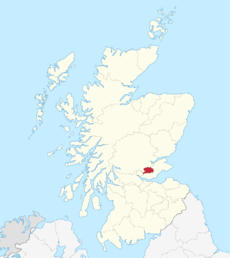Kinrosshire
| County of Kinross | |
|---|---|
 Kinross-shire within Scotland |
|
| Area | |
| • 1975 | 46,485 acres (188 sq. km) (33rd) |
| History | |
| • Succeeded by | Tayside Region |
| Status |
Local government county (until 1975) Land registration county (1996 - ) Electoral ward |
| Chapman code | KRS |
| Government |
County: Kinross County Council (1890 - 1929) Lieutenancy: Lord Lieutenant of Perth and Kinross (1975 - ) |
| • HQ | Kinross (county town) |
| • Motto | For all time |
|
Coat of arms of the county council |
|
County: Kinross County Council (1890 - 1929)
Perth and Kinross County Council (1929 - 1975)
The County of Kinross is a historic county in eastern Scotland, administratively part of Perth and Kinross. Surrounding its largest settlement and county town of Kinross, the county borders Perthshire to the north, Fife to the east and south, and Clackmannanshire to the west.
Scotland's second smallest county, Kinross-shire is dominated by Loch Leven, a large inland loch, with two islands and an internationally important nature reserve. One of the islands contains a castle, where Mary, Queen of Scots was once held prisoner. Much of the land in Kinross-shire is fertile agricultural land and most of the inhabitants were originally employed in farming. The gently-rolling farmland surrounding Loch Leven gives way to steep, more rugged terrain at the outskirts of the county.
The shire or sheriffdom of Kinross was formed in the thirteenth century when the two parishes of Kinross and Orwell were removed from the Fothriff area of Fife. Cleish, Portmoak and Tullibole were added by act of parliament in 1685. As local government in Scotland evolved, Kinross-shire gained a county council in 1890, which was later amalgamated with Perth County Council under the Local Government (Scotland) Act 1929.
The county suffered a decline in population in the 19th and 20th centuries, as its inhabitants migrated to the cities to find work in manufacturing, etc. The population in 1891 was 6,673; in 1971 it was 6,423. The decline was hastened by the closure of the railways in the county soon after the Second World War. However, in recent years, construction of the M90 motorway north of the Forth Road Bridge has resulted in the area becoming more prominent. Tourism has increased, with visitors attracted by the unspoiled country villages and gently rolling hills reaching the shores of Loch Leven. The villages of Kinnesswood and Scotlandwell are attractive, and there are ancient standing stones at Orwell. The T in the Park music festival has been held in Balado since 1993, becoming a major annual event.
...
Wikipedia
